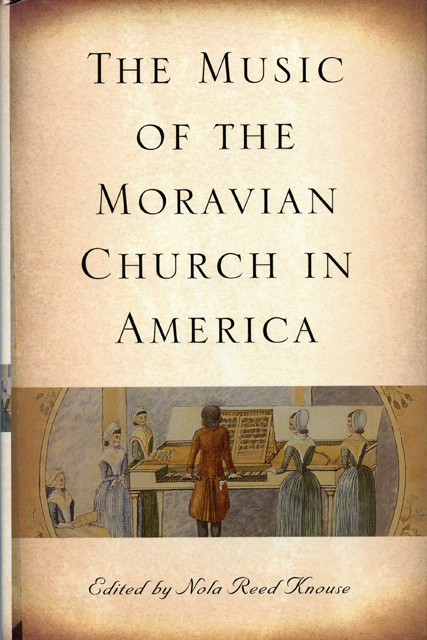Book contents
- Frontmatter
- Contents
- List of Illustrations
- Foreword
- Preface
- Acknowledgments
- 1 The Moravians and Their Music
- 2 Moravian Worship: The Why of Moravian Music
- 3 Hymnody of the Moravian Church
- 4 Moravian Sacred Vocal Music
- 5 The Organ in Moravian Church Music
- 6 The Role and Development of Brass Music in the Moravian Church
- 7 The Collegia Musica: Music of the Community
- 8 Music in Moravian Boarding Schools through the Early Nineteenth Century
- 9 The Piano among the Moravians in the Eighteenth and Nineteenth Centuries: Music, Instruction, and Construction
- 10 Moravian Music: Questions of Identity and Purpose
- Appendix 1 Biographical Sketches
- Appendix 2 A Moravian Musical Timeline
- Bibliography
- List of Contributors
- Index
- Eastman Studies in Music
8 - Music in Moravian Boarding Schools through the Early Nineteenth Century
Published online by Cambridge University Press: 10 March 2023
- Frontmatter
- Contents
- List of Illustrations
- Foreword
- Preface
- Acknowledgments
- 1 The Moravians and Their Music
- 2 Moravian Worship: The Why of Moravian Music
- 3 Hymnody of the Moravian Church
- 4 Moravian Sacred Vocal Music
- 5 The Organ in Moravian Church Music
- 6 The Role and Development of Brass Music in the Moravian Church
- 7 The Collegia Musica: Music of the Community
- 8 Music in Moravian Boarding Schools through the Early Nineteenth Century
- 9 The Piano among the Moravians in the Eighteenth and Nineteenth Centuries: Music, Instruction, and Construction
- 10 Moravian Music: Questions of Identity and Purpose
- Appendix 1 Biographical Sketches
- Appendix 2 A Moravian Musical Timeline
- Bibliography
- List of Contributors
- Index
- Eastman Studies in Music
Summary
Early Factors in Founding of Schools
A number of factors in the history of the Moravian Church contributed to the success of music education in the schools. From its inception, leaders of the ancient Unitas Fratrum valued education. By 1495, Bishop Lukáš of Prague had led the church to establish a school in each of its two hundred congregations and to open several institutions of higher learning. Although a 1508 mandate prohibited Moravian religious practices, before 1510 fifty or more printed works appeared from the press of the Unity. Bishop Jan Amos Comenius (1592–1670), the author of historical and theological treatments of his church, also expounded on the necessity of early childhood training that included music.
At Herrnhut, music flourished in the 1730s as an instrumental ensemble was introduced to accompany sacred choral and solo works. Documentation of a collegium musicum there dates from 1731. Communal housing for Single Sisters and Single Brothers provided not only lodging and apprenticeships in trades, but also units for day-to-day social camaraderie, spiritual discussions, the instruction of youth, and group singing.
Two schools established by the Brethren in Saxony became the primary institutions of training for Moravian clergy and teachers: the Paedagogium (boarding school for boys) at Niesky, established in 1742, and the theological seminary at Barby, established in 1754. Although these educational divisions were subsequently moved on occasion between Niesky and Barby, those two centers remained the major sources of training in theology and music for the European teachers of the Moravian men discussed in this study. A publishing house was also started at Barby.
Bethlehem, Pennsylvania, was founded in 1741 as the administrative headquarters of the Brethren's missionary enterprises in the New World. Although it remained the focal point of Moravian activity in America, Nazareth, Lititz, and Salem all gained fine reputations as centers of education. The excellent progressive education offered at these Moravian schools may be credited in large part to the heritage of Hus, Comenius, Zinzendorf, and other university-trained leaders. While parents traveled on missionary assignments, boarding schools were a natural outgrowth of the Single Sisters’ and Single Brothers’ houses for nurturing children left in care of the home congregation. Children of local residents attended the “day” or “town” school.
- Type
- Chapter
- Information
- The Music of the Moravian Church in America , pp. 212 - 227Publisher: Boydell & BrewerPrint publication year: 2009



